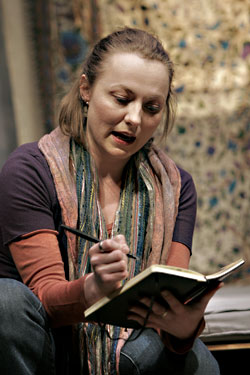The moment I turned off Mercer and onto the path leading to the Rep’s Leo K. theater Saturday night, an elderly man in a sports coat shuffled up and, not impolitely, intercepted me. “Are you going to Rachel Corrie,” he asked. I told him I was, and he shoved into my hand a pamphlet of stapled white paper. Ah, Jesus, I thought, here we go. I opened the page to see all the other Rachels besides Corrie—the Olympia native killed at the age of 23 by an Israeli-driven bulldozer while trying to protect a Palestinian home from destruction in 2003—who have been killed by Palestinian suicide bombers. Not too many steps further, I encountered a couple more demonstrators, holding signs and standing beside a wooden easel holding a large, framed poster of Corrie that said “Stop the Killing.” I accepted their literature as well, a yellow handbill eulogizing Corrie in agitprop. The moment I began to move on, a gust of wind tipped the easel, and as it crashed to the ground, I reached to save it. Before I could grab it, however, I heard the glass in the frame crash and splatter, and I yanked my hand away. “Thank you,” one of the demonstrators said. “It wasn’t me,” I protested. “It was the wind.” Then I realized he really meant it.
This aura of agitation and unresolved conflict makes My Name Is Rachel Corrie, a one-woman play based on Corrie’s personal writings, a unique theater experience. First off, and most crucially, it’s impossible to be even halfway informed and still neutral on the subject of the Israeli-occupied territories; this long-standing conflict between Arabs and Jews cuts to the bloody heart of civilization itself. And in the interest of full disclosure, I suppose I should say: Suicide bombing disgusts me, yet I fail to see how a seriously subjugated, impoverished, incompletely armed, and continuously besieged population qualifies as a serious threat to the Jewish state—one representing, as the old man’s Zionist literature claims, “a genocidal movement of Arab fascists seeking to destroy Israel.”
Second, and by extension, sitting in the audience during this play is a distinctly odd and somewhat disconcerting experience—one that, for us in our relatively safe haven of world domination, might not be such a bad experience to have. My Name Is Rachel Corrie, a play of youthful idealism and confrontational despair that digs under the skin of complicity and apathy, creates a particular discomfort and anger—one that seemed palpable in the theater both prior to and during the show. At best, the tightness in the theater the night I attended represented a strangled withholding of judgment, one that somewhat stifled response to the play itself; at worst, it represented plain old anger.
I didn’t expect to like the play because, frankly, I didn’t expect to particularly like Rachel Corrie herself. For personal reasons I’d rather not discuss here, I have cause to be frustrated with young people who appear driven to die halfway across the world for an issue that obsesses them. I believe their efforts would be better served in their homeland, begging us all to wake up to the particulars of global injustice and the U.S. government’s hand in it. Strong feelings, yes, which makes it all the more surprising that I left the theater deeply moved by the play and feeling very, very sad that Rachel Corrie is dead; from what I saw, I like her—a lot. The reasons for that are manifold, not least of which is the writing of Corrie herself, which is disarmingly vulnerable, unusually wise, and heartbreaking.
The role of Corrie is played by WET veteran Marya Sea Kaminski, one of the most talented and diverse theater people we have in this city. During the course of the play—a narrative stitched together by playwrights Alan Rickman and Katharine Viner from Corrie’s journal entries, e-mails, and correspondences—Kaminski achieves such moments of transcendence that she is literally transformed; she channels Corrie’s emotions in such a way that she breaks down all artifice, reaching directly into the soul of the material. The trajectory of the play, which opens in Corrie’s dorm room on the Evergreen State College campus in Olympia and ends with her walking offstage to her death, moves like a crescendo: If there are moments of meandering in the beginning, they are erased by the bristling momentum of rage and fear in the play’s second half—a second half announced rather frighteningly by unexpected gunshots in the night. Braden Abraham’s direction is superb, and the set design and sound work are perfect. The play ends on a definite note of pathos, yet one that is undeniably moving in its desperation to memorialize its subject.
There’s not much more to be said. This is a gutsy play, and it should be seen—especially by those most opposed to it. To stopper one’s ears to the imperfect and searching humanity behind youthful indignation is to miss the real truth behind why we choose or don’t choose to fight.








